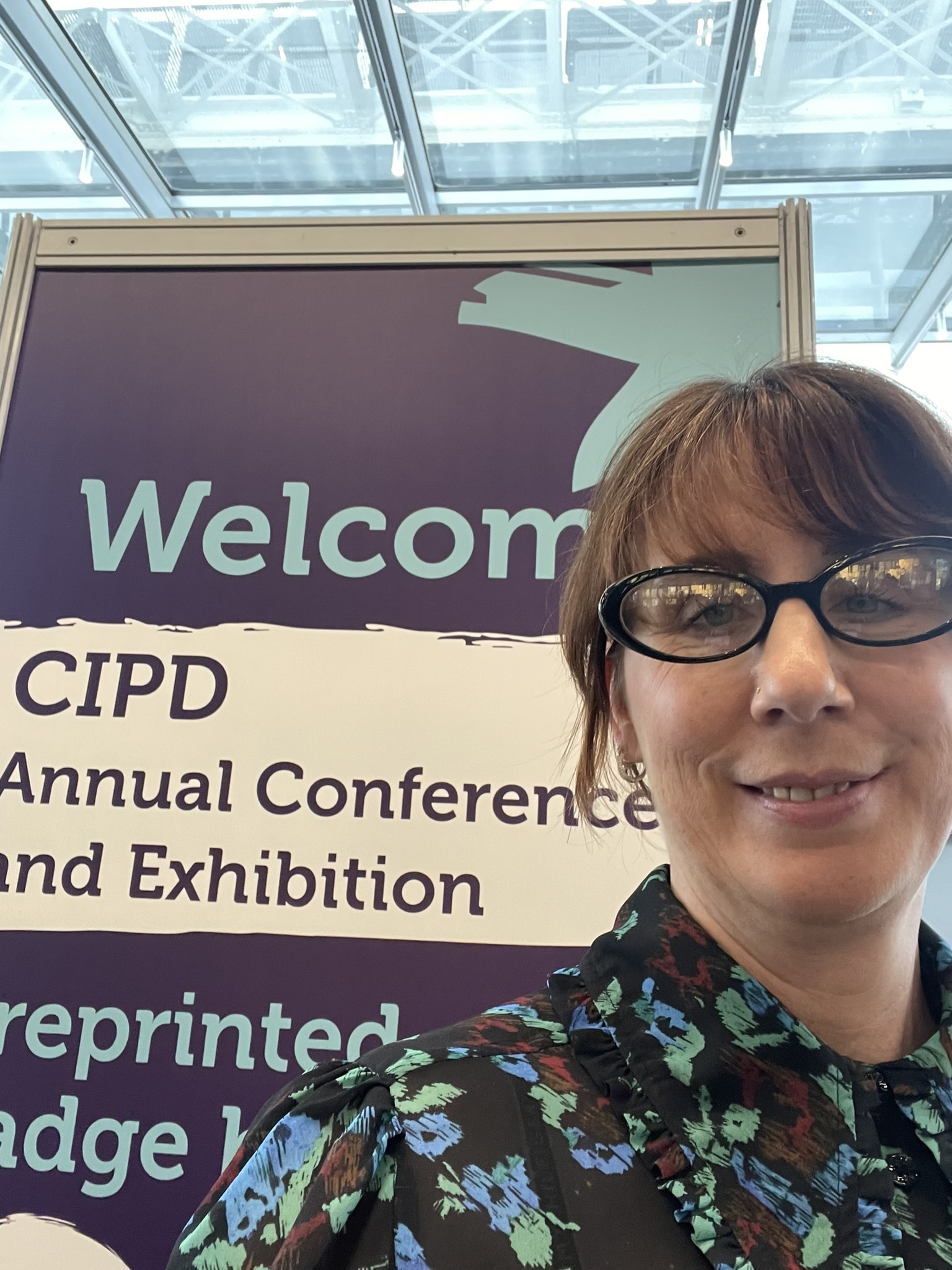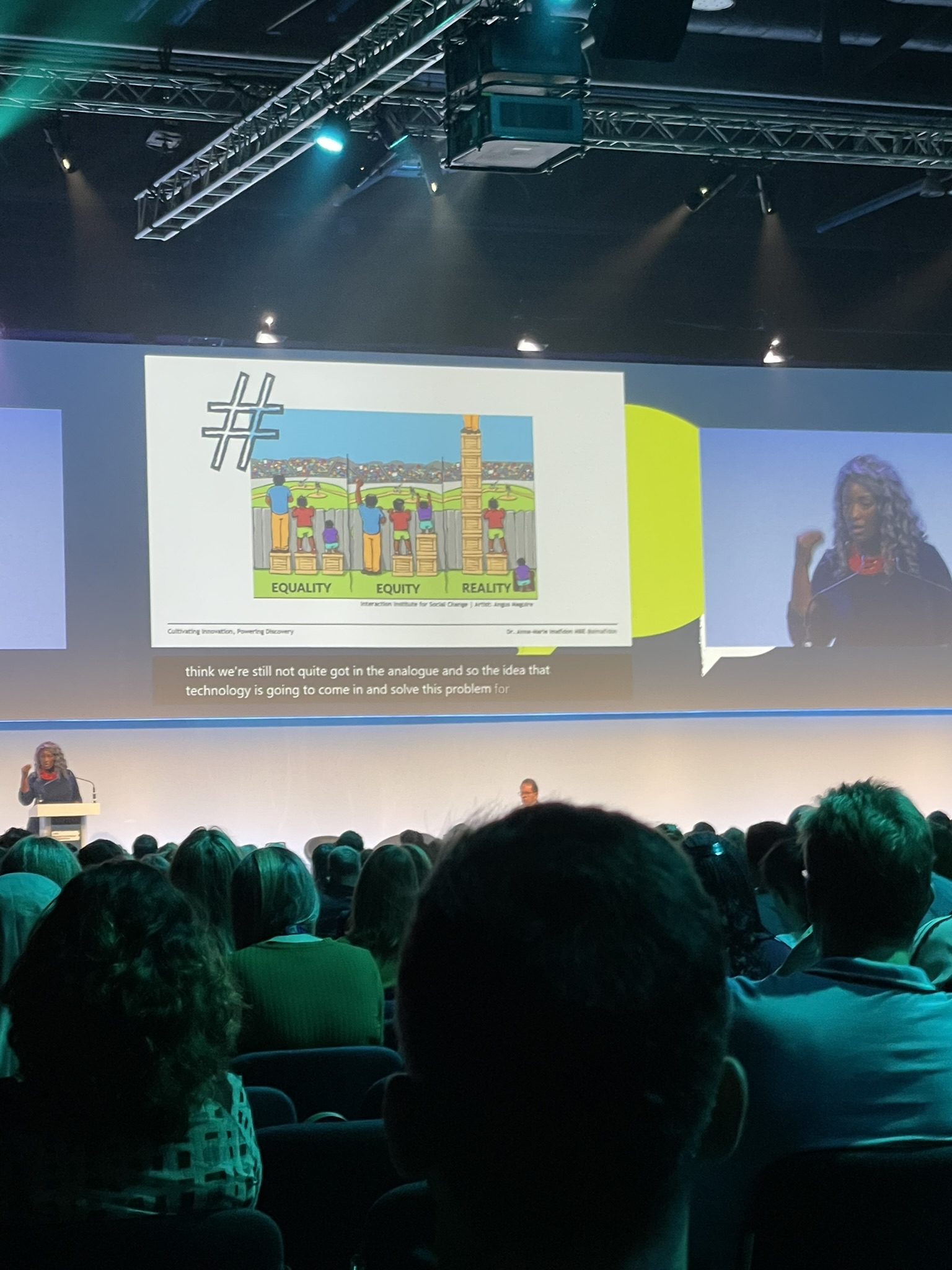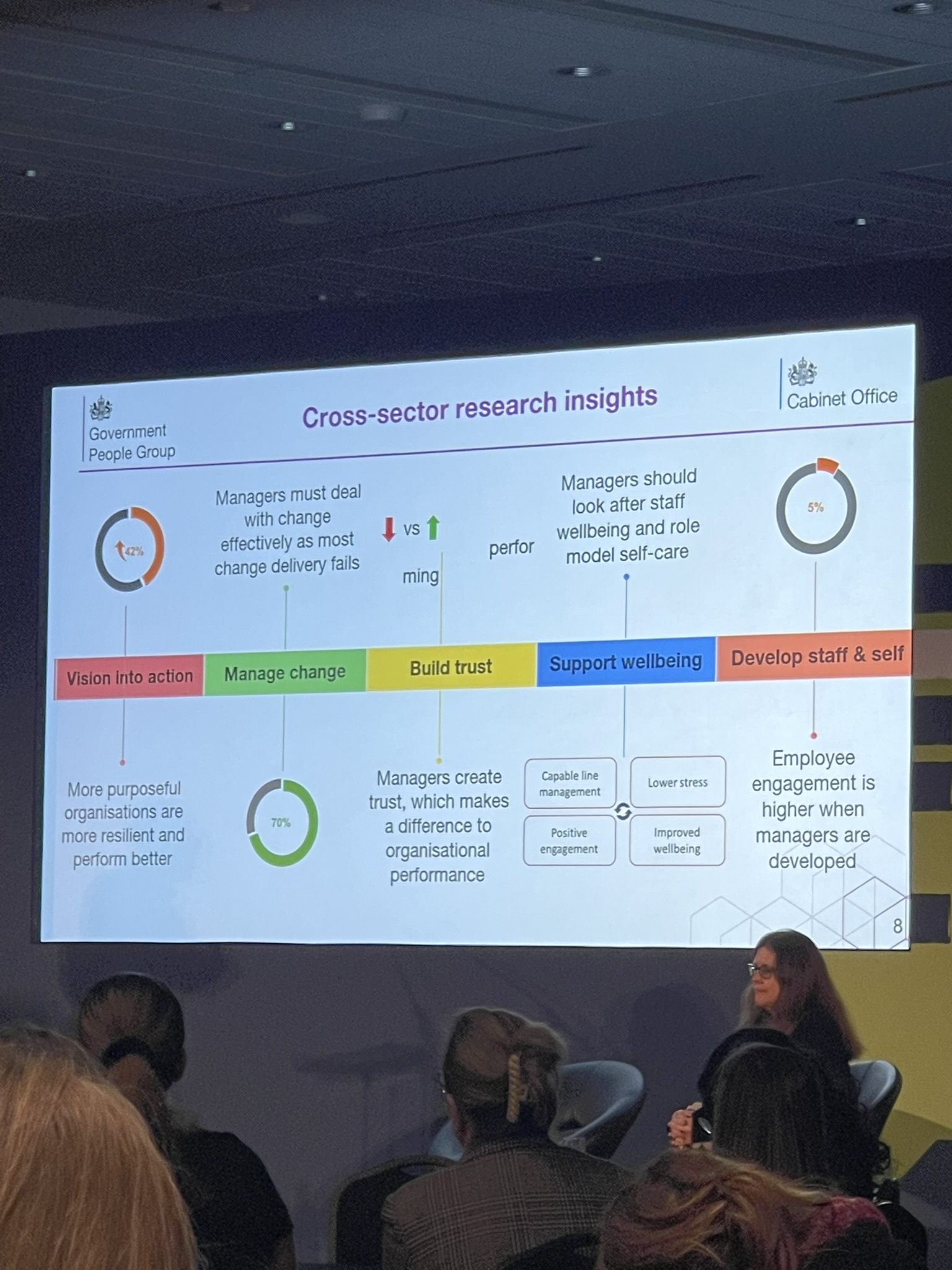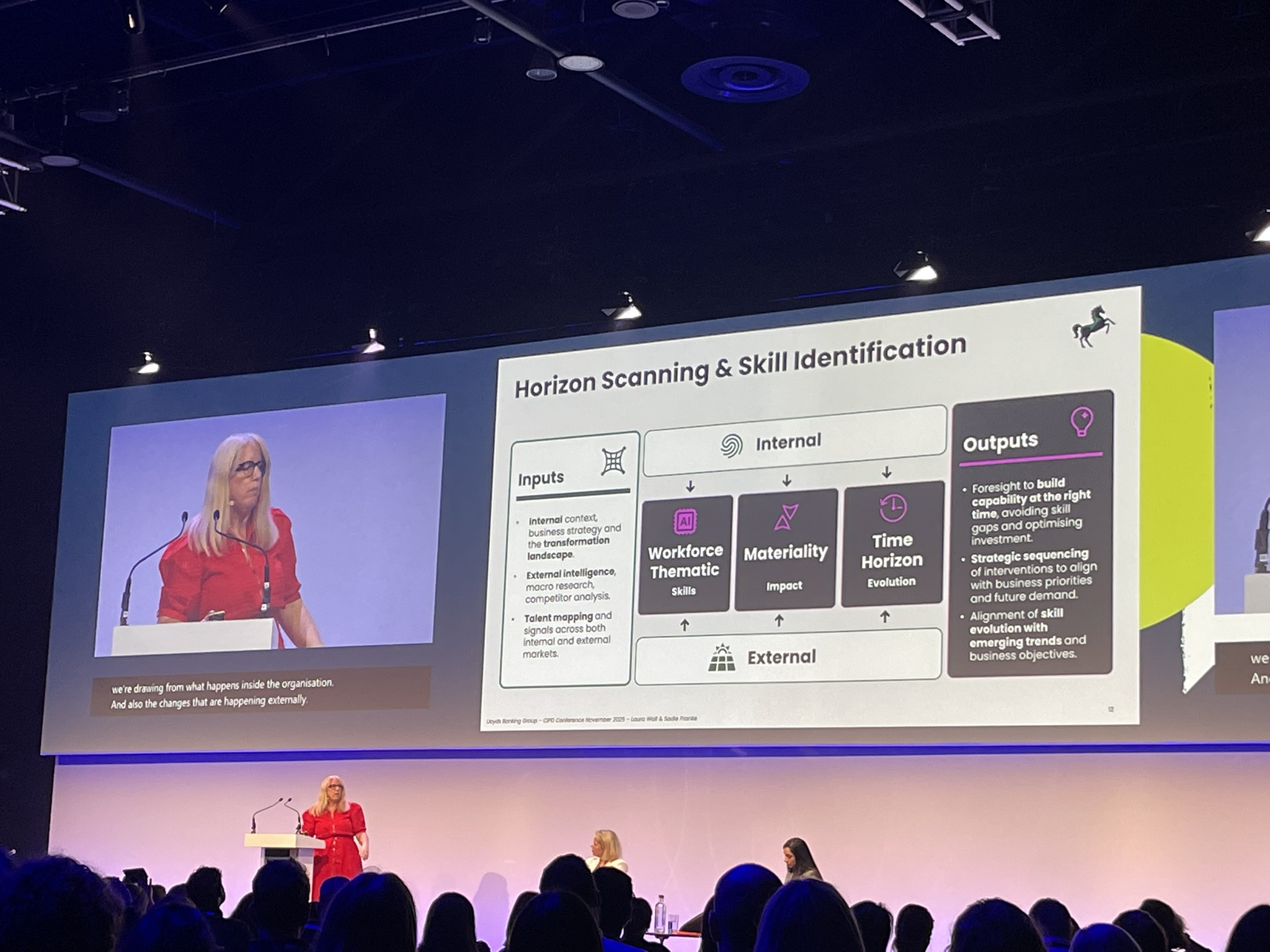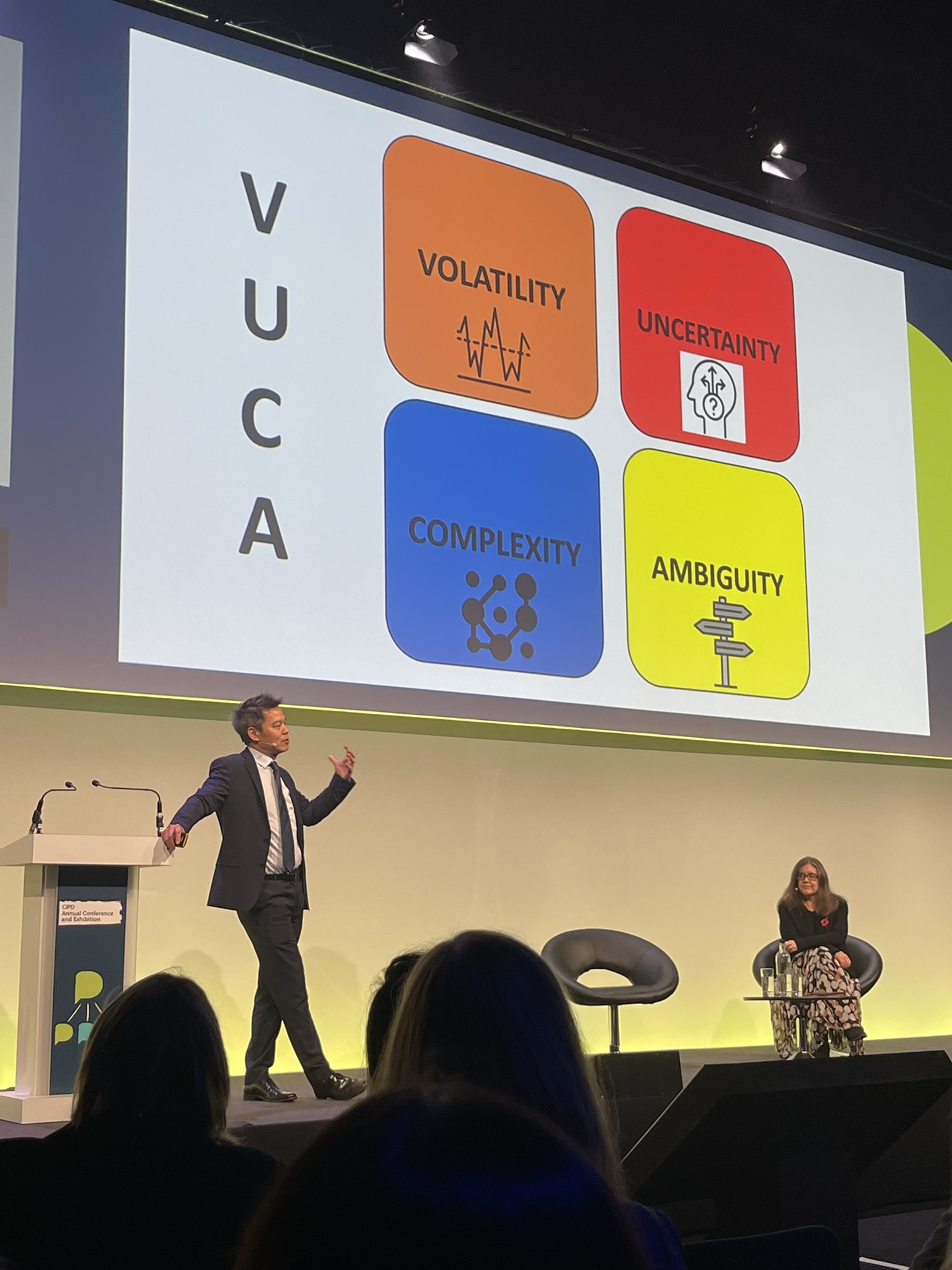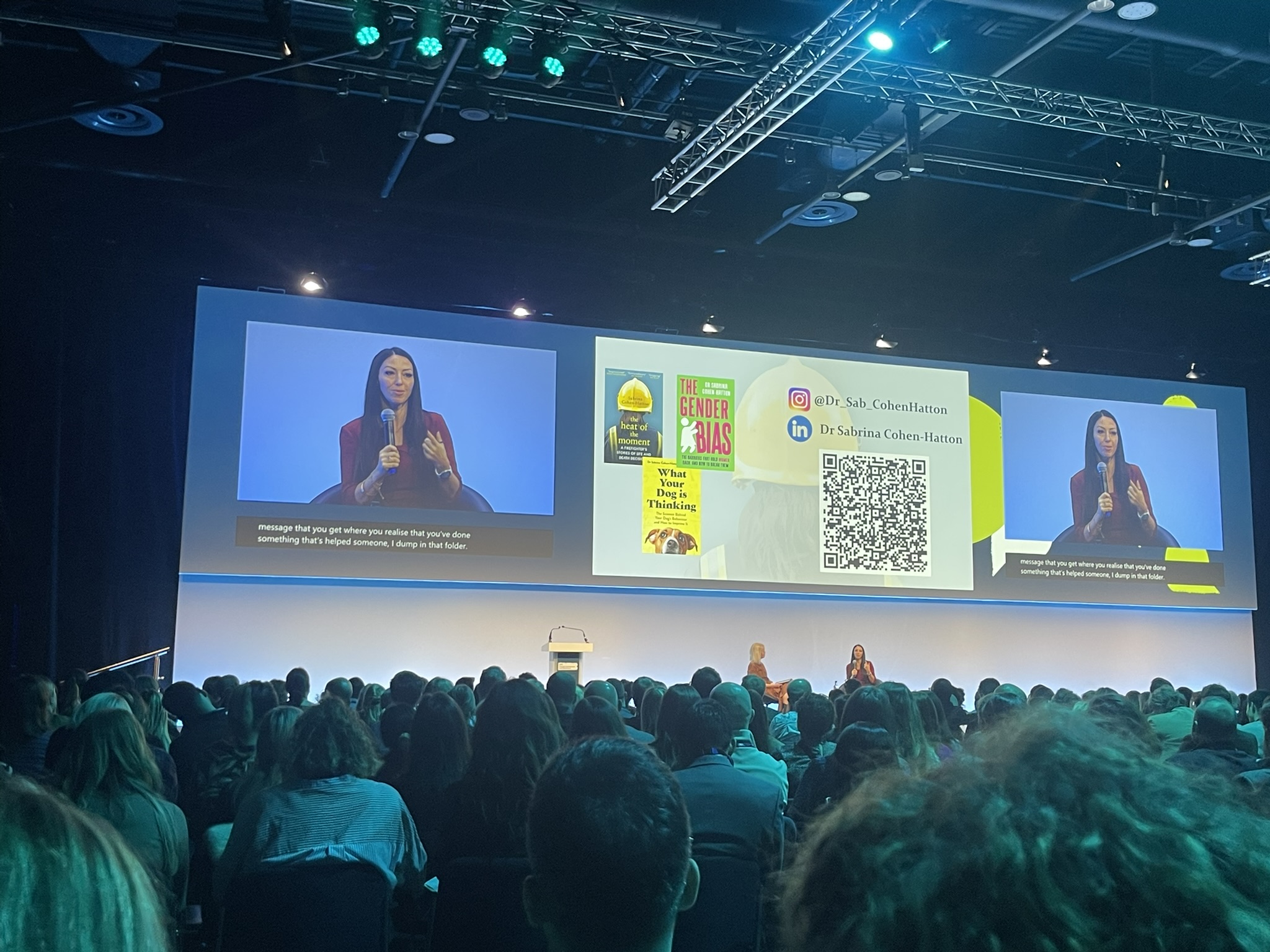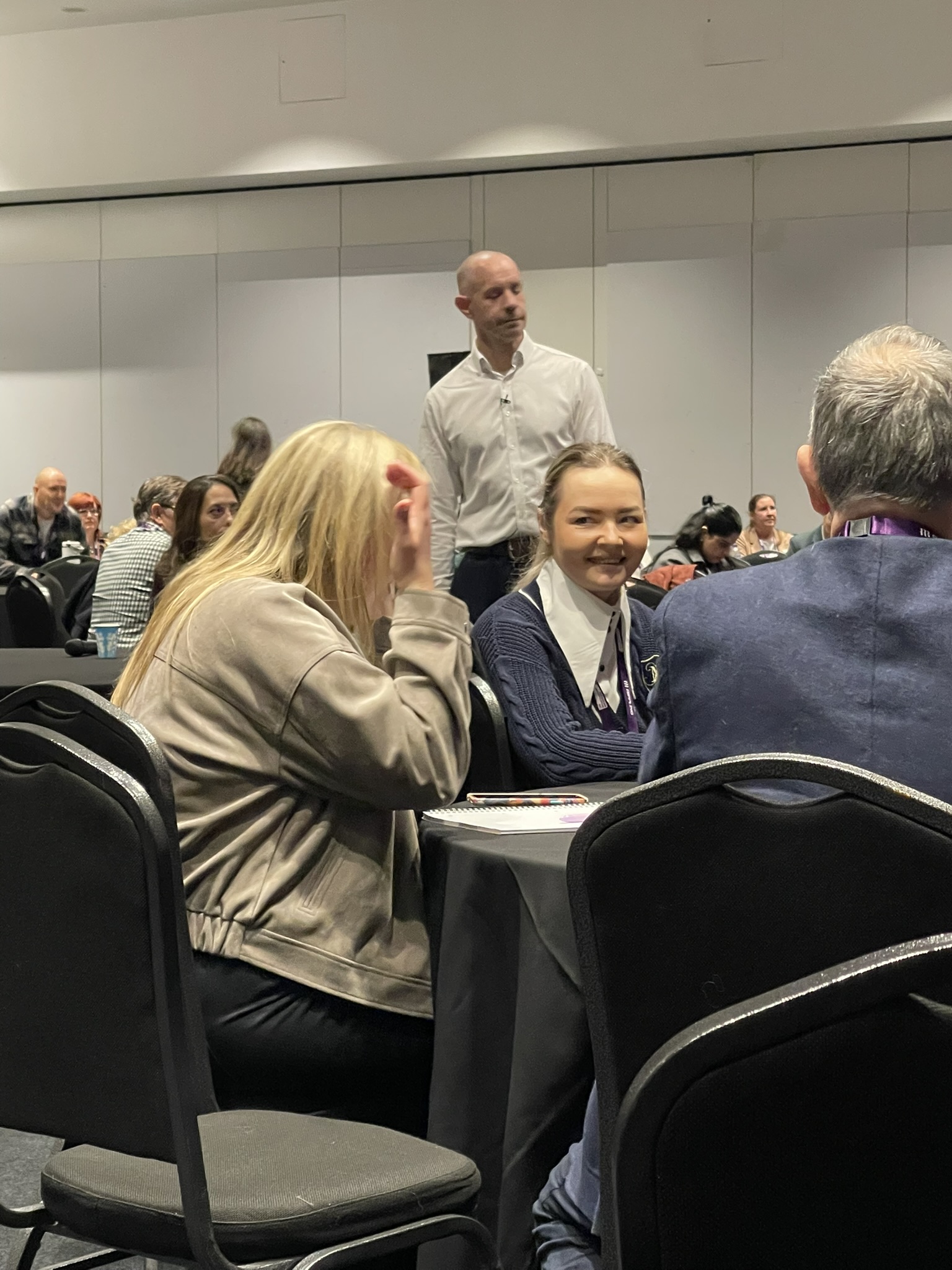CIPD Annual Conference and Exhibition (ACE) 2026
Gill Chester from Little Man Project shares her insights from CIPD ACE in Manchester (November 2026), with the aim to provide charities with a summary and the key points of as many talks as possible.
Keynote: The Future of Work – How to Lead, Adapt and Innovate for What’s Next
Dr Anne-Marie Imafidon MBE
Masterclass: Building an L&D Strategy for Stronger Line Management
Matthew Meynell, Deputy Director of Leadership, Cabinet Office
Case Studies: Right Skills at the Right Time – How to Master Strategic Workforce Planning to Meet Future Needs
Laura Wall (Lloyds Banking Group) and Natalie Dalton (Registers of Scotland)
Keynote: Leading Under Pressure – What HR Can Learn from Extreme Environments
Professor Kevin Fong OBE
Panel: Navigating the Future Skills Horizon – What Skills Are Coming Next?
Fiona Aldridge (Skills Federation) and Gemma Marsh (Skills England)
Keynote: Rising from Adversity – Resilience, Leadership and the Power to Change Your Story
Dr Sabrina Cohen-Hatton KSMF
Fishbowl: RIP Traditional Learning! What is the New Role of L&D in the Age of AI?
Steve George, Head of Learning, CIPD
Keynote: Speaking Truth to Power – Politics, People and the Future of Work
Nick Robinson
Gill Chester at CIPD ACE
You may not have been able to attend CIPD ACE, so in this article I aim to provide a snippet of what you might have missed and, more importantly, what you might be able to learn from.
Before I start, a quick word of warning. This conference featured three amazing keynote sessions from speakers who have had truly remarkable life experiences. If you’re lucky, you get one great keynote, so three was amazing. All shared personal stories with the humility and honesty that left the room so quiet, I wondered at one point if anyone was breathing. I’ve included links for each one so you can learn more about their life and work. It’s honestly worth it.
Keynote: The Future of Work – How to Lead, Adapt and Innovate for What’s Next
Dr Anne-Marie Imafidon MBE
Traffic meant I only managed to catch the last twenty minutes of Dr Anne-Marie Imafidon’s keynote, but it was enough to make a lasting impression. Her session struck a balance between realism and optimism, exploring how we can lead through the uncertainty of the Fourth Industrial Revolution.
Before I discuss her session, I’d like to provide a brief bio for Anne-Marie. At 11, she was the youngest girl ever to pass A-level computing, and at 20 years old, she received her Masters in Mathematics and Computer Science from the University of Oxford. Since then, she has been awarded Honorary Doctorates from five UK universities. If that is her education, just imagine what she has done since then…. Oh, and her MBE was for services to young women and STEM sectors.
Back to the session… Anne-Marie urged us to stay curious (a theme repeated during the conference). She stresses the need to keep learning a little more each week, and to embrace ‘quality mistakes’. The idea is to allow us to view mistakes as opportunities for insight and progress, rather than creating fear. She spoke about the need to build, measure, and iterate our ideas with agility, reminding us that the future of work is still being written and belongs to everyone, not just technologists.
Her examples, from Elle Woods’ unexpected brilliance in Legally Blonde to Nobel-winning scientists who studied art, highlighted that difference fuels innovation. The message isn’t a new one: diversity brings new things to the table. However, it hits differently when the focus is on success, rather than just avoiding failure. She closed by urging L&D professionals to recognise their influence: the systems, norms, and learning experiences we design can shape a fairer, more inclusive future of work.
It was practical, hopeful, and deeply human, leading me to buy the audio version of her book for the drive home. Her book continues the call to action, urging us to be curious and to ensure we are learning something new each day about technology, rather than giving up and saying, “I don’t understand X or Y.” Instead, it encourages us to dive in and incrementally become more knowledgeable each day.
Key takeaways for L&D in charities:
- Be endlessly curious. Growth comes from small, continuous learning.
- Encourage experimentation. Reward ‘quality mistakes’ and shared learning.
- Celebrate difference. Diverse thinking drives innovation and inclusion.
- Keep humans at the centre. Technology should serve people, not replace them.
- Recognise your influence. L&D professionals help shape what the future of work looks like.
Masterclass: Building an L&D Strategy for Stronger Line Management
Matthew Meynell, Deputy Director of Leadership, Cabinet Office
This masterclass presented a unified approach to improving line management across the Civil Service, developed by the Cabinet Office. With more than 100,000 managers in a workforce of half a million, the goal was to bring consistency, clarity, and higher standards to one of the most complex people systems in the UK.
Matthew Meynell outlined how his team utilised research from universities, industry bodies, and consultancy partners to define what “good line management” entails, focusing on empathy, trust, active listening, and self-awareness. The new standards are now embedded into recruitment, performance management, and training pathways, supported by a structured curriculum aligned to the Civil Service Code.
While the approach is outside the ability of most charities, the session provided an interesting look at how a large, distributed organisation can tackle inconsistency in management capability. The emphasis is on setting expectations, defining standards, and building a shared learning framework.
Key takeaways for L&D in charities:
- Set clear expectations. Start with agreed standards of what good looks like.
- Support new managers early. Provide learning before promotion, not after. This includes people who are just considering the role, so they can see if it’s a good fit for them.
- Embed learning in systems. Build management development into recruitment and performance processes.
- Model good practice. Senior leaders must show that people management is valued and be required to complete their own training.
- Measure what matters. Track how better management improves wellbeing and performance.
Case Studies: Right Skills at the Right Time – How to Master Strategic Workforce Planning to Meet Future Needs
Laura Wall (Lloyds Banking Group)
Natalie Dalton (Registers of Scotland)
This session explored how two large organisations are addressing the challenge of ensuring they have the right skills for the future. Both speakers emphasised that strategic workforce planning is not just about producing a plan, but about leading a long-term change programme.
Natalie Dalton from Registers of Scotland described how her team reframed workforce planning as a continuous change process rather than a one-off document. She shared that they found engaging people in honest conversations about ‘present pain points’ helped frame a conversation that had previously been ‘I’ve no idea, I don’t know the future’.
Laura Wall from Lloyds Banking Group spoke about horizon scanning, looking across technology, risk, and sustainability to anticipate future skill needs. Her team utilises scenario planning and data to inform investment in emerging skills, such as AI literacy and operational resilience. This was based on a framework that they had developed.
While some of the technical details went over my head, it was fascinating to see how both speakers combined data, foresight, and storytelling to make workforce planning more human and strategic.
Key takeaways for L&D in charities:
- Treat planning as change. Focus on transformation, not just numbers.
- Start with real challenges. Use current pain points to engage people about the future.
- Build shared assumptions. Collaboration brings clarity when the future feels uncertain.
- Scan the horizon. Continue learning about trends that may impact your workforce.
- Tell the story. Data only works when people understand the vision behind it.
Keynote: Leading Under Pressure – What HR Can Learn from Extreme Environments
Professor Kevin Fong OBE
This was one of the most memorable sessions of the event (although there were a few others). Professor Kevin Fong combined science, storytelling, and humanity to explore what leadership really means when lives are at stake. Drawing on his career in space medicine, emergency response, and intensive care, he took the audience inside moments where calm, clarity, and teamwork were the difference between success and failure.
It was his experience during the COVID-19 response that hit hardest. Until recently he held the position of National Clinical Advisor in Emergency Preparedness Resilience and Response for the Covid-19 Incident. A job title he was quick to joke about. He described through images and his personal experiences, how, in the early days of the pandemic, systems and protocols quickly became irrelevant. Leadership became about coordination and humility, listening, improvising, and making decisions with incomplete information. He reflected on the pressure of working alongside exhausted colleagues, the fear of getting things wrong, and the necessity of collective problem-solving. His point was simple but profound: in a crisis, no one leads alone. The best leaders enable others to act with confidence, even when certainty has disappeared.
Another theme that stood out for me was his points around followership, a concept new to me that Kevin believes is as important as leadership. In extreme environments, everyone must be ready to lead or follow depending on what’s needed. This was clearly illustrated in his description of the process of working for the Helicopter Emergency Medical Service (i.e. the air ambulance service). In that setting, the leader changes to fit the location and situation. He may be the oldest and more senior medically, but when they are taking off and flying, the pilot is the leader. When they land, the paramedic is the leader. So, Kevin is the leader for only 5-10 minutes when he assesses the patient. Before and after, he is the follower. It isn’t as clear for most of us, so we need to develop the skill to know when to switch. He challenged the traditional image of the heroic leader and instead celebrated teams that communicate, trust, and adapt in real-time. Another powerful and inspiring message for L&D is that preparation and reflection are what make this possible. Rehearsal builds muscle memory, but it’s debriefing, honest, blame-free reflection, that builds resilience. “You don’t rise to the occasion,” he said, “you fall to the level of your training.”
Key takeaways for L&D in charities:
- Leadership and followership are equally important. Great teams share responsibility and adapt as situations evolve.
- Plan, practise, reflect. Rehearsal builds confidence; honest reflection builds learning.
- Lead through uncertainty. Trust, communication, and empathy matter more than rigid control.
- Stay humble under pressure. True leadership is about service and being calm in chaos.
- Build collective strength. Crisis leadership is a team effort, not a solo act.
Panel: Navigating the Future Skills Horizon – What Skills Are Coming Next?
Fiona Aldridge (Skills Federation)
Gemma Marsh (Skills England)
This session examined how the UK’s skills landscape is evolving, with a focus on how employers, government, and education providers can collaborate to prepare individuals for the changing world of work. While I’m not sure the discussion fully answered the question in its title, it did provide insight into the scale and complexity of national skills planning.
Gemma Marsh outlined Skills England’s mission to simplify the system, close regional gaps, and support employers to access the right training. She spoke about the need for shorter, more flexible learning options, recognising that traditional apprenticeships don’t suit every employer or sector. She also touched on digital and AI skills, noting that upskilling the existing workforce is just as important as preparing young people for new jobs.
Fiona Aldridge highlighted the growing importance of human skills, such as communication, collaboration, problem-solving, creativity, and information literacy, as technology automates more technical work. She reminded the audience that lifelong learning is about more than productivity: it strengthens wellbeing, community, and opportunity, particularly for those furthest from education and employment.
Key takeaways for L&D in charities:
- Prioritise human skills. Communication, empathy, and problem-solving are vital in every role.
- Think local and flexible. Regional partnerships and modular learning can make training more accessible.
- Prepare for AI and digital change. Invest in confidence as much as competence.
- Promote lifelong learning. Continuous learning benefits people, organisations, and communities.
- Collaborate widely. The future of skills depends on shared action between sectors.
Keynote: Rising from Adversity – Resilience, Leadership and the Power to Change Your Story
Dr Sabrina Cohen-Hatton KSMF
Dr Sabrina Cohen-Hatton’s opening keynote on the second day was the third powerful conference session. Again, full of powerful moments of inspiration, she gave a deeply moving and personal account of resilience, empathy, and the science of leadership under pressure.
She began by sharing her story of homelessness as a teenager, describing how she washed in public toilets, put on her school uniform, and went to class as if everything were normal. That experience, she explained, taught her the most important lesson of her life: you never know what someone else is dealing with. It was her first lesson in empathy, and it shaped everything that followed.
After joining the fire service at 18, Sabrina found a sense of belonging and purpose in helping others on their worst days. But she also faced sexism, harassment, and doubt about her place as a woman in a male-dominated service. Her second moving story was set many years later, when she responded to a serious fire and thought her husband, also a firefighter, might have been seriously injured. She viscerally described her physical response to this terrifying experience, which made her realise how easily decision-making can be clouded by emotion and stress. Determined to understand why, she began studying psychology and went on to earn both a degree and a PhD while working full-time.
Her award-winning research explores what happens in the brain when people make decisions under pressure. She explained that stress floods the body with cortisol, shutting down the prefrontal cortex, the part responsible for logical thought, and pushing people into reactive, instinctive behaviour. She shared a simple, evidence-based technique known as cyclic sighing: two short breaths in and a long breath out, repeated several times. This helps rebalance oxygen and carbon dioxide levels, calm the body, and restore clearer thinking. Her research has significantly influenced the way the UK fire service now responds to emergencies.
Sabrina spoke about the importance of psychological safety, explaining that it’s not about comfort but about trust. Having the confidence to speak up, admit mistakes, and learn from them. She described how creating that environment has been central to her leadership philosophy. She also reflected on imposter syndrome and social mobility, reminding the audience that difference can be a superpower, and that resilience is not about never falling but about having the courage to rise again.
It was a profoundly moving and practical session, delivered with warmth, humour, and humility.
Key takeaways for L&D in charities:
- Empathy transforms leadership. You never know what others have faced before they walk into the room.
- Stress changes thinking. Under pressure, people need time, calm, and structure to make good decisions.
- Build psychological safety. Learning only happens when people feel safe to fail and try again.
- Science meets humanity. Understanding the brain can help us design better learning under stress.
- Keep going. Resilience is built one decision, one setback, and one success at a time.
Fishbowl: RIP Traditional Learning! What is the New Role of L&D in the Age of AI?
Steve George, Head of Learning, CIPD
What stood out for me in this session wasn’t the content but the format. It was my first experience of a fishbowl discussion, a technique that I thought was a brilliant idea in a conference setting.
A fishbowl starts with three people on a table in the centre of the room. One chairperson and two initial responders. The chairperson asks the first question, and the two people respond. After answering, they stand up and leave the table, going to sit elsewhere in the room. Anyone from the audience can step into an empty chair to join in and answer the question. This creates a constantly evolving conversation where the audience effectively becomes the panel, sharing their perspectives, questions, and experiences in real-time. Our topic was AI and the role of L&D. The central table saw a series of panellists, each giving their perspective. As the supply ran dry, a new question was posed. The session ended with the original panellist returning to answer the final question.
I was struck by how well this approach would work with L&D professionals from charities, especially in communities of practice or learning network events. It gives a great opportunity to share experiences and surface practical solutions without the hierarchy of a traditional panel.
Key takeaways for L&D in charities:
- Experiment with formats. A fishbowl encourages inclusive, dynamic discussions.
- Share the floor. Everyone has expertise worth contributing.
- Use it for reflection. It’s ideal for exploring complex or uncertain topics, such as AI.
- Flatten hierarchy. The model removes barriers between speakers and participants.
Keynote: Speaking Truth to Power – Politics, People and the Future of Work
Nick Robinson
Nick Robinson’s keynote was entertaining and wide-ranging, filled with political anecdotes and reflections from his long career in broadcasting. I didn’t feel that the session offered much direct insight into the workplace or the future of learning, but it did provide a thoughtful examination of uncertainty, leadership, and the forces shaping modern politics.
He began with stories from his time covering figures like Sir Alex Ferguson, John Prescott, and George W. Bush, using them to illustrate the human side of leadership — from Ferguson’s habit of chatting to the laundry staff every week to remind them they mattered, to the way political figures can lose touch with reality when surrounded by power.
Much of the talk centred on how unpredictable the world has become (which he acknowledged we were all too familiar with). Drawing on decades of political reporting, Robinson argued that anyone claiming to know what happens next, in politics, economics, or society, is either “a liar or a fool.” He pointed to the rapid changes of the past decade, from Brexit and Trump to the rise of populism and cultural division, illustrating how these global forces now shape our everyday lives and workplaces.
Although the session leaned more towards political commentary than practical advice, Robinson offered a glimmer of optimism. His core message was that leadership, in government, business, or daily life, depends on clarity of story. Organisations, he said, lose direction when they forget who they are and what they stand for. Leaders who focus on values, empathy, and narrative are the ones best equipped to navigate uncertainty.
Key takeaways for L&D in charities:
- Uncertainty is the norm. Plan for change, not stability.
- Stories shape strategy. Every organisation needs a clear, unifying narrative.
- Stay connected to people. Leadership starts with listening, not broadcasting.
- Beware assumptions. The world rarely behaves as experts predict.
- Hold on to hope. Progress often feels messy, but small, consistent action still matters.
As I conclude, I would like to share two additional observations.
The first was the number of amazing female speakers at this conference. At an HR conference like this, you would expect this. But what struck me is that these weren’t heads of HR or L&D, they were heads of tech, government bodies, organisations and award-winning researchers. I obviously know they are out there, but it was the first time I’ve been at an event where most speakers were women at the top of their game.
The second observation was the inclusive provision made at the conference. I do not have accessibility requirements and am not an expert. I’m sure there were additional things that could have been done (for example, a live BSL translator) BUT this is by far the most provision I’ve seen jointly provided by the conference and the Manchester Central Convention Complex. From designated wheelchair spots to priority seats for people with extra needs, well-signposted hearing loops, quiet rooms, baby rooms, and low counters at food stalls. Small facilities that can make a big difference.
There were so many examples of this that it became a ‘Where’s Wally?’ game, which I played to spot and photograph them.
About Gill Chester
Gill is passionate about helping charities and not-for-profits create learning experiences that truly make a difference. As the founder and Director of Little Man Project, an award-winning company she started in 2010, she leads a talented team developing creative, effective elearning for organisations around the world. With over 25 years’ experience, Gill loves building lasting partnerships and finding new ways to help teams learn, grow, and thrive.

CL Consortium Ltd
Vine House, Selsley Road,
Stroud, GL5 5NN
The Charity Mentoring Network: A community platform that connects organisations, staff and volunteers together.


